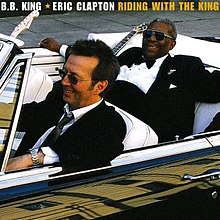Riding with the King (B. B. King and Eric Clapton album)
| Riding with the King | ||||
|---|---|---|---|---|
 |
||||
| Studio album by B.B. King and Eric Clapton | ||||
| Released | June 13, 2000 | |||
| Genre | Blues rock | |||
| Length | 61:13 | |||
| Label | Duck / Reprise | |||
| Producer | Eric Clapton, Simon Climie | |||
| B.B. King chronology | ||||
|
||||
| Eric Clapton chronology | ||||
|
||||
| Professional ratings | |
|---|---|
| Review scores | |
| Source | Rating |
| AllMusic | |
| Entertainment Weekly | A |
| The Spokesman-Review | Mixed |
Riding with the King is a blues album by Eric Clapton and B.B. King that was released in 2000. It was their first collaborative album and won the 2000 Grammy Award for Best Traditional Blues Album. The album reached number one on Billboard's Top Blues Albums and was certified 2× Multi-Platinum in the United States. Riding with the King was also released on a DVD-Audio in higher resolution and with a 5.1 surround sound mix in 2000.
The album was generally well received by reviewers, although some felt that it could have been better, and that the sound on the CD was too polished for a blues album.
Riding with the King was the first collaborative album by Eric Clapton and B.B. King. They performed together for the first time at Cafe Au Go Go in New York City in 1967 when Clapton was 22 and a member of Cream, but did not record together until 1997 when King collaborated with Clapton on the song "Rock Me Baby" for his duets album, Deuces Wild. Clapton looked up to King and had always wanted to make an album with him. King said they had discussed the project often, and added: "I admire the man. I think he's No. 1 in rock 'n' roll as a guitarist and No. 1 as a great person." At the time of recording Riding with the King, Clapton was 55 and King 74.
Clapton initiated the recording sessions for Riding with the King and included some of his regular session musicians on the album. He also chose the songs and co-produced the album with Simon Climie, who had previously worked on several of Clapton's albums. While this would appear to be a Clapton album recorded with King, Clapton gave center-stage to King, who took the lead on many of the songs with his singing and his solos.
...
Wikipedia
